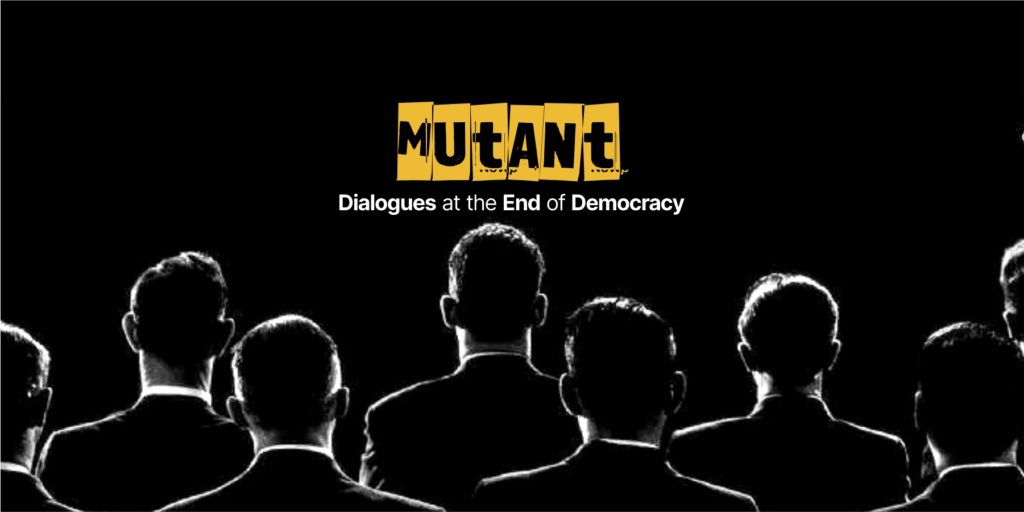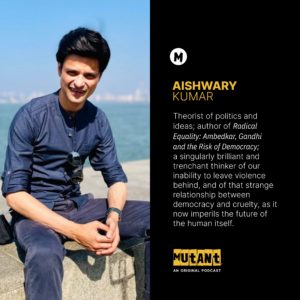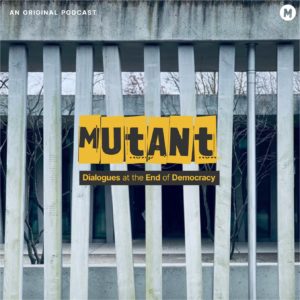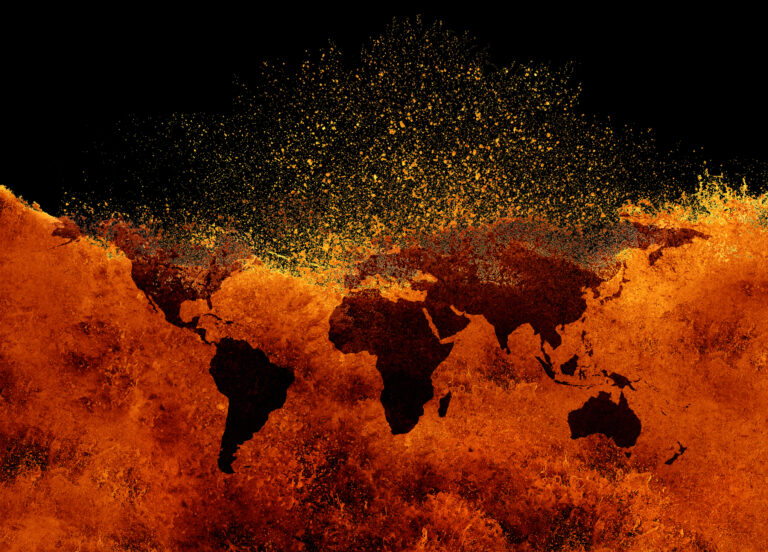“Your Cruelty Does Not Speak”
As violence against persons and things reaches a slow, catastrophic intensity worldwide, our compulsions are taking down with themselves not only our common faith in the democratic experiment, they are warping our very ability to do things with words. Payal Puri begins a dialogue with Aishwary Kumar in Los Angeles.

In April 2019, to mark the publication of the Indian edition of his 2015 book Radical Equality: Ambedkar, Gandhi and the Risk of Democracy, Aishwary Kumar and I, Payal Puri, first began a conversation about democracy — on a public stage in Hyderabad, India — that has, in some sense, never really ended.
It was almost immediately clear to us that this is not just another moment in the long and often violent history of democracy. Rather, in large parts of the world, democracy and democratic practice have today mutated into something entirely unrecognizable. We are today, as Aishwary puts it, in the heart of the most classical autoimmune disorders within democracy. It is as if the most stable democracies were at war with themselves, to which their constitutions have no moral response and their majorities have nothing but collective indifference to offer.
What is up with democracy? This was the question we posed, and it led us to undertake the most original, ambitious and rigorous archaeology of the words and concepts that constitute democracy in our time.
We call this archaeology, Mutant.

Payal: Aishwary, a year ago, on January 30, 2022, in a lecture on Cruelty, Dignity and Resentment — to mark this date on which Mahatma Gandhi was assassinated by the Hindu nationalist Nathuram Godse in 1948 — you drew one of the most philosophically and conceptually vital distinctions between words we use casually, even interchangeably, in civic and political life: anger and resentment. I want to begin, as we assume this responsibility of returning to ourselves a vocabulary with which to understand this moment of democratic degeneration, by asking, how do you read Godse?
Aishwary: Perhaps the greatest ever act of Indian resentment is Nathuram Godse’s shooting of Mahatma Gandhi at point blank range on January 30, 1948. Godse read the same text, the Gita, that Gandhi did. He believed in the same sets of ascetic principles, including celibacy, as Gandhi. And the question here is not as sometimes said whether Gandhi’s politics bred a certain mode of Hindutva… I do not think there is a direct line of descent between Gandhi and his assassins. But I do think that there is something about resentment that speaks in a language of utter silence.
Consider the main distinction between anger and resentment. Anger is visible. Anger is palpable. Anger has a language. And so anger is also easily identifiable. Anger, in fact, goes on to define entire identities, and sub-identities within identities. Look, here is an angry black man. An angry Dalit. An angry woman. Anger is easily identified, easily attributed and easily disparaged, because anger embraces a certain form of speech-making. It remakes the world in a language of its own, uncorrupted by power. Which is why anger belongs only to the province of the wronged. Anger is always and only, the language of the oppressed.
As opposed to that anger is resentment. The silent. The seething. The almost monastically disciplined, the rigorously ascetic that commits its crime in absolute broad daylight. Resentment doesn’t have its own language. It simply takes on the dominant mode of speaking, insinuating itself into a certain kind of normative language that we have come to assume is politically neutral. Resentment is difficult for us to grasp precisely for this reason, because rather than taking on its own philosophical or even physical language, resentment is calm, it’s steady, it simmers. If anger is a sort of moral intensity, resentment is a moral concentration. Of what, you might ask? And this is where no-one thinks more closely of this than Gandhi himself. A moral concentration of self. And with that, we finally come to see resentment for what it actually is: the concentration of the self to that extreme limit where only the injury to me matters anymore.
This is where resentment also cannot be separated from those moral and political principles, values and practices in which silence plays a major part. We know that in Indian ascetic traditions the withdrawal from language itself is central. The withdrawal from chatter, from gossip, from opinion. Everything that the moral philosopher and thinker B R Ambedkar associates with the creative disagreements of a democratic life, including its anger, are overtaken in a caste society by a seething resentment. In Annihilation of Caste in 1936, it is this insinuation of resentment as norm that Ambedkar calls India’s armed neutrality. We are armed, we just don’t see it. We are willing to kill, we just don’t accept it. We are ready for combat, we will never concede it.
Resentment is the moral concentration of the self to that extreme limit where only the injury to me matters anymore
Payal: Does Ambedkar write at all about anger?
Aishwary: Ambedkar is, quite simply, angry. And he’s so frank about being angry that there is a moment in 1943, in his essay on Ranade, Gandhi and Jinnah, that he says something as straightforward and explicit as “I consider my feelings of hatred a real force. They are only the reflex of love that I bear…” Think of this. What he is doing is betraying every Brahminic move of hiding behind the unsaid. Brahminism is a technology, a technique of hiding behind the invisible. It perpetuates itself by being or remaining unsaid. And in this regard, and I’m quoting Derrida here, he says, “in this love of the unsayable, India is not the absolute other of Europe.” That is to say, these two traditions have a certain affinity for the unsayable. That both give their epistemology its power, and its punitive, vindictive energy, through the unsayable.
Payal: In what sense do you use unsayable here?
Aishwary: Something that does not require a language, and which the moment is touched by language is corrupted. If you, for example, call Brahminism by its name, you’re corrupting it. Now think of this in the context of of post-independent and modern India. In how many discussions and conversations around political philosophy, if it exists at all, have we actually talked about Brahminism as a mode of argument rather than this unsaid superhuman framework that defines and codes everything. And I think this is what Ambedkar is doing in Annihilation of Caste. What he is annihilating is an epistemology of unaccountability, of deliberate, wilful silence that goes in the name of religion. He’s not — and those who love religion should know this better about Ambedkar — saying let’s destroy all concepts of the religious. He’s saying, to not destroy a religion that thrives in the unsaid and the unaccountable is an irreligious way of living. If you truly are religious, according to him, you would destroy the religious silence that sits on this multitude. Annihilation for him is the destruction of silence. Annihilation is the refusal of complicity. Annihilation is the rejection of a politics of resentment.
Payal: One of the reasons I wanted to enter this dialogue through those two words — which we will return to in more sustained form — is because you make palpable the stakes of giving ourselves a language to grasp, and articulate, the democratic and planetary catastrophe staring us in the face.
This, then, is the time and place to introduce our podcast, Mutant.
Mutant is an alphabet, the first of its kind, of global political thought. Never has a podcast attempted to compress, in 52 words — two for every letter of the Roman alphabet, A through Z — the human condition itself.
Over 26 episodes, we will speak to the history of political thought, political theory, and moral philosophy alike. Already this brief foray into the words anger and resentment begins to illuminate the moral psychology that has cut through our political language, words — and silence — now weaponized for violence by those who were once entrusted with the integrity and righteous use of their very meaning.
But I’d like to probe the role of words a little further. Of every entrypoint into democracy we might have chosen, Aishwary, why language?
Aishwary: At the very heart of what we call the risk of democracy is the demise of meaning, the emptying of words.
In the end, democracy becomes possible and comes into the world as a shared belief in something more than merely a collective of individual interests. Democracy is, first and foremost, a shared and collective promise of a better world and of a world that, if not entirely just, is somehow constituted by our collective effort to create a world of least injustice.

Photo: Arjun Kumar
Democracy is not our ride into perfection. Democracy is our experiment with disappointment, and these two elements of democracy can be understood in their fullness only when we realize that so much of what we promise to one another is in the end a question of words. How we speak to one another, how we make promises to one another. The very — as Hannah Arendt would say — the very promise of politics is the gravity of our words. Or rather, it is the gravity of our words that holds together the promise of our politics, and therefore, our future.
When we got together for this dialogue, this was on our minds. I think readers should know that well after I had crafted the expression ‘The Risk of Democracy’ for my book Radical Equality, it was for the first time in our conversation, and it was for the first time you who asked what was risky about it. And what was risky back then had not fully shown its hand even to me, though I had articulated it as such.
It seems to me that the greatest risk to democracy is a certain free fall of and in our language.
So these 52 words through which we will travel into democracy are our attempt to bring a certain gravity to the promises that we, in a democracy, make to one another.
Democracy is unthinkable without this gravity, without this commitment to meaning. Because one thing democracy is not is cheap nihilism. The cultivated ability, but also the willingness, to believe in nothing. That’s not democracy.
Payal: Before we come to this inventory, we need to enter the skin of a word many might find uncomfortable, even disturbing, used as it is here for democracy: Mutant. Why do we, you and I, call democracy a Mutant?
Aishwary: I think when we came to the idea of a dialogue that would push through the extreme limits, perhaps even the ends of democracy, we began with a concession, that what an examination of democracy must entail is a certain refusal of stasis.
Mutant, as concept and as word, was for us a resistance of that false sense of certainty that the mere mention of democracy sometimes generates in the modern world. Even more precisely, Mutant was a way to move beyond certain sorts of timeless claims about what democratic self-government means. It was a refusal to concede that the ideological core of democracy had already been set forever and that all we needed to now do, therefore, was to find a perfect form of democracy.
It is somehow assumed that a perfect form of self-government has been found, that its ideological core has already been secured, that the rights it promises have already been guaranteed and that any deviation from it should be enough, therefore, to generate apocalyptic pronouncements about the death of democracy.
Mutant is the rejection of both, that false certainty that democracy can generate and the apocalyptic tremors it sometimes unleashes. Mutant is a refusal of the idea that democracy has an ideological core that is immovable. At the same time, Mutant is a concession to the idea that nothing in democracy is impenetrable by violence and by evil, and that democracy and evil can not only coexist together, they might even nourish each other. Mutant is the declaration of that possibility staring us in our face.
Payal: Coming to this inventory, it has taken months to isolate, with rigor, the concepts and ideas that can compress the sprawl and gravity that this dialogue about democracy demands. It’s an audacious idea in itself: to distil, in 52 words, everything we think needs saying or thinking about democracy in our time. For you, what does this inventory accomplish? And for a listener who comes on this 26 episode ride with us, what will they understand about these concepts, and about democracy as such.

Photo: Nishat Fatima
Aishwary: Well, the first and last promise I would say we make to anyone who trawls through these words with us is that there is some virtue, despite everything, in the idea that we say no to unjust power and pose our faith in our capacity to govern ourselves.
It can, at times, seem unnecessary to remind ourselves that it’s a great idea that a society or a people decide to rule themselves. But democracy has mostly existed as an exception. Through large parts of human history, it was never self-evident that democracy is the best form of government and there’s only a certain point in history at which we realize that self-rule is the best form of rule. So in some ways, this is a reminder of that common sense. What these words will do, let us hope, is restore to democracy a certain immovable power of our common sense.
This isn’t a grand philosophical idea we are chasing. This is a travel into ordinary language, because words can heal, words can wound, words can restore, but in the end words can also destroy.
And there is, therefore, a certain relationship between democracy and the word, between democracy and the words we use in a democracy, because that relationship is where language becomes rhetoric and words become weapons.
What we hope to do over this 52 word archeology, as it were, is to restore commonsensical understandings of words that do not refuse the power they have to both heal and wound. I also hope the way we have chosen these words will make it palpable, even visceral, that these words now matter more than ever to our democratic survival. That these words, whether they are notions or ideas or concepts, even names of thinkers, carry in themselves much more than the sum of their individual meanings.
There is a relationship between democracy and the word, between democracy and the words we use in a democracy, because that is where language becomes rhetoric and words become weapons
And that is what we mean by the power of common sense. Our collective, our shared, our unequal, but our always committed conceptions of what words can do.
Payal: There’s two dimensions I want to touch on before I come to a question. When we first started speaking about words what was startling, as someone who has worked with language professionally, was the brutally rude awakening to my own careless use, often abuse, of it.
The sustained process of isolating words for Mutant, of entering their moral and philosophical skins, has come for me to be an animating intent of this podcast. My own experience has been that if you return gravity to just one word, it changes how you view all words. To give time to one word is to fundamentally alter your relation to language.
The second and equally powerful dimension Mutant has illuminated is the realization that our real crisis of language occurs in what you referred to as ordinary language. Words so commonplace we lose sight of the fact that no two of us might mean the same thing when we use the same word.
But even beyond that absence of shared meaning, sometimes the very ubiquity of a word means we actually don’t have a clear grasp of what it means at all. And the word that leaps to mind here is arguably the most normative word in a democracy…the word democracy itself.
We are today laying out the framework for Mutant rather than excavating or deconstructing a word in particular, but I do think it would be a misstep to enter a larger inventory of words without first examining the word democracy. What to you is democracy?
Aishwary: This will sound tautological, but let me say it nonetheless. Democracy is not a thing that we can grasp or hold in our hands or even capture in a mere sum of words. So when you ask what is democracy I’m immediately tempted to answer, democracy is a mutant. Democracy is both a promise and a disappointment. Democracy is both a destination and a very checkered ride. Democracy is both a very serious art of government; democracy at the same time is the ability and the right to have humor about that government. Democracy is to take our government seriously. Democracy is the ability to make fun of how seriously we take government.
For me, this inventory allows different points of breach rather than an examination of normative presuppositions or assumptions about what democracy ought to look like. Democracy can be many things, and there’s nothing normative about it.
What makes democracy so powerful in our imagination is that it is first and foremost a right to choose who we are. In other words, democracy is the freedom of choosing identities.
To be more philosophical or conceptual about it, democracy is our experiment in shared freedom, the ability to and the right to be anything one wants to be.
It is also, therefore, our right to make that which is invisible, visible. This is why — as we will see and make amply clear when we pick up the words under the letter C — democracy cannot survive in the shadows of something that is invisible. And one of those invisible things is caste, which does not exist, we are told.
Payal: Among the thinkers you return to most frequently is Hannah Arendt. And there is a formulation of Arendt’s you use that speaks very powerfully to this dialogue we are entering into, and that is the right to have rights.
Is democracy also the right to have rights?
Aishwary: That’s a brilliant entry into this inventory for the sheer irony of it. The woman who refuses to call herself a philosopher because philosophy is what men do; a woman so attuned to the fragility of human freedom; a woman so committed to examining what could be the most durable forms of political freedom somehow coins an expression so powerful, we cannot stop using it. “The right to have rights.”
This is also a thinker who, by the way, rarely ever poses faith in democracy. What is striking about Arendt is how infrequent her use of the word democracy is in her political thought. She will at times use more colloquial expressions or identities to attribute to people. Words like ‘conservatives’. Notions such as ‘liberals’ or ‘liberalism’. But she rarely ever uses the word democrat. Or democracy.
It seems like Arendt’s belief in the right to have rights does not necessitate our commitment to democracy at all.
And therefore, we need to ask whether democracy is something more than a mere sum of our rights? Is Arendt suggesting something more to the right to have rights than mere democratic survival, or democratic coexistence even?
That’s where I think it becomes important, for me, to understand that there is something more at the heart of our struggles with political and moral life than democracy. This is also why I believe that talk of the demise of democracy is slightly overblown, because what is it that we really want? A world of rights, or a world of electoral majorities that always risk taking democracy away from its founding principle?
This is also a way to return to that question you raised in our first ever conversation almost four years ago, about the risk of democracy. And the greatest risk of democracy is that electoral majorities in democratic societies start to take their liberty as their license. And that slippage between liberty and license is the catastrophic risk at the heart of our commitment to democracy.
Payal: I want to clarify, since we say that claims about the end of democracy are overblown, why we have chosen to title this journey Dialogues at the End of Democracy. The relation between the word ‘Mutant’ and the ‘end’ of democracy, which is for us not a moment of closure, of demise, but of morphing.
Aishwary: I love that, the formulation that this is not a closure but a mutation. Because our coming together for a dialogue at the end of democracy is also an idea in something else, which is that we are coming to this dialogue about the ends of democracy. That is to say, what is it that democracy is good for?
What is it that we want to accomplish by being democratic?
Democracy has undergone a radical shift over the last quarter of a century. If you look at the world’s most populous liberal democracy, India…I call it India’s 30 Years War, between 1992 and 2022, which begins with the demolition of the Babri Masjid in Northern India.
Something very tragic occurs in ’92. The tragedy is not that a 16th century mosque is demolished by a highly well-trained, regimented band of paramilitary personnel — I can’t think of another word for these trained and motivated fanatics — the tragedy was not simply the demolition; the tragedy was the extremely curated wave and surge of urban indifference that follows that crime.
The 30 Years War in our own religious history has been somehow framed as a crisis of our secularism, when actually this is not simply a crisis of secularism. This is a crisis of our moral compact to be human, let alone to be constitutionalists. It is a false claim to say we are all constitutionalists, we are not; for one, we don’t all fundamentally understand the constitution and its intricacies. But it’s precisely India’s urban population which might have understood what was at stake in our constitutional compact that meets this horrendous crime — a crime both against and the national past and its future, a crime both against our deep, rich history of archeological remains and our profoundly liberating histories of architectures — it’s precisely those parts of the population that meet this crime with indifference, which opens a whole new abyss in what, in a democracy, is supposed to be a very firm line between what is judicial and what is extrajudicial.
In the last 30 years that line — between what is judicial and extrajudicial, constitutional and anti-constitutional, political and anti-political, moral and above all, evil — those lines are completely blurred, possibly forever.
Mutant tries to return to the most primary and primal scenes of that blurring in the history of our democratic consciousness. It is that moment, 30 years ago, that is the beginning of what I call the neodemocratic moment or the neodemocratic condition.
Payal: That seems to suggest, in how you frame it, something much bigger than an event in the life of a country; rather it seems like a turn in the history of democracy itself. Do you think what began in 1992 was a moment of transformation in Indian democracy, or for democracy as such?
Aishwary: Both, but if compelled to choose, I would say the latter. Democracy as such begins to morph into something that will forever change the sort of politics we associate with modern political forms that are democratic in theory, if not entirely in practice.
Both, because of course in India, which is the world’s largest, most populous democracy it becomes clear for the first time that no matter what the ruling dispensation, no matter who is in power, it is often very, very easy for the majority to get away with the crime that is unpunishable.
You brought up Arendt, and this reminds me of that staggeringly effective formulation in her essay Some Questions of Moral Philosophy where she says, “whatever is unpunishable is permitted”. Part of the risk of democracy and what we’ve called the neodemocratic condition or neodemocratic dysfunction, is that anything that the majority now seems to believe it can get away with, it also starts to believe it is permitted to commit.
Anything that the majority now seems to believe it can get away with, it also starts to believe it is permitted to commit, and that is what we call the neodemocratic condition or neodemocratic dysfunction
We know that the case against the primary accused in the Babri demolition lasted over two decades and ended with the acquittal of every single person accused of inciting that crime. What is fascinating for me in this farce is that over a period of time, some of the frontline figures of that moment then become the icons of majoritarian political life in India, which tells us something about what majorities or majoritarian rule can be when given not an anti, but a highly intensified democratic mandate. And that is the risk that begins in India.
But the fact is that this was not true only of India, even at this particular and very specific moment. More importantly, I believe that whatever happens to democracy in India happens to democracy anywhere. There’s a reason why a blatantly racist president of the United States can be hosted by an army of diasporic Indians who form the fiscal backbone of the modern Hindu Right. There is what I like to call a global majoritarian coalition, whose rage is fueled not by the fact that it has been disenfranchised by globalization; its rage is fueled by the fact that it has benefited the most from it, and that’s the paradox that we need to unpack. We need to be very wary of narratives — and this returns us to the beginning of this dialogue — that suggest that the current age is an ‘age of anger’, and that those who are angry are so because they’ve been left behind in the modern and epic story of globalization.
You look at paramilitary forms of politics, of mass politics that have begun to thrive in places as diverse as Hungary, India, the United States, and recently Italy, and you realize that this is not a coalition of people left behind. It’s a coalition of profiteers, oligarchs, financiers of the modern electoral system worldwide.
Payal: This moment in global democracy seems an exemplar of what you, following Jacques Derrida, potently describe as “democracy’s autoimmune condition”. It is a powerful, even visceral phrase, because it posits that democracy is inherently predisposed to hurt itself. But even more, it seems to suggest democracy as a permanent act, therefore, of trying to overcome something. And that there is, so to speak, no arrival in democracy, there is nothing beyond the trying. “Democracy yet to come,” as you say, also following Derrida. What is democracy’s autoimmune condition?
Aishwary: I think you hit it right on the head. Democracy’s autoimmune condition is not simply its propensity to hurt itself. That is, a system of government and of constitutional checks and balances that hurts itself. That is pretty obvious…all regimes have some measure of self-destructiveness built into them. What is fascinating about democracy’s autoimmune disorder is that it touches not simply a system of government, but the very idea of the human…and therefore the use of the word autoimmune is a very evocative, visceral, almost biological metaphor (although we need, always, to be very suspicious of all claims of biologism). But it also has to be taken very seriously because you don’t, in a democracy, hurt simply a government. When you attack yourself, you hurt your neighbor. And that is what is autoimmune in democracy — that when given a free fall or when it loses all sense of gravity, democracy can become suicidal, to the point of self-destruction.
This is why we say, and we will flesh this out when we come to our episodes around certain words in Mutant, that in democracy what is most violent is not the spilling of blood, but a collective neglect of the most vulnerable. Neglect, as we know, is one of our two N words.
Our ability to be democratic is not, in that sense, incompatible with our ability to be disdainfully indifferent to one another, and that is the neodemocratic condition we are faced with today, that negligence and neglect have come to not only coexist, but thrive with a certain grandiosity and exaggerated professions of being democratic.

Mutant: Dialogues at the End of Democracy launches soon, with Episode 1 devoted to the letter A, and two words that are a visceral embodiment of democracy’s promise and potential. One, of course, is Anger, and we will be examining what delegitimising political anger can do to imperil a democracy — and why democracy itself cannot survive without returning to anger its revolutionary fire.
Alongside that, a word that immediately evokes one of the most singular thinkers the world has ever known, and one of the most obdurate crimes to dog democracy.
That question is caste. The thinker is B R Ambedkar. And the word is Annihilation.
We’ll see you, back here, for Mutant, Episode 1.



